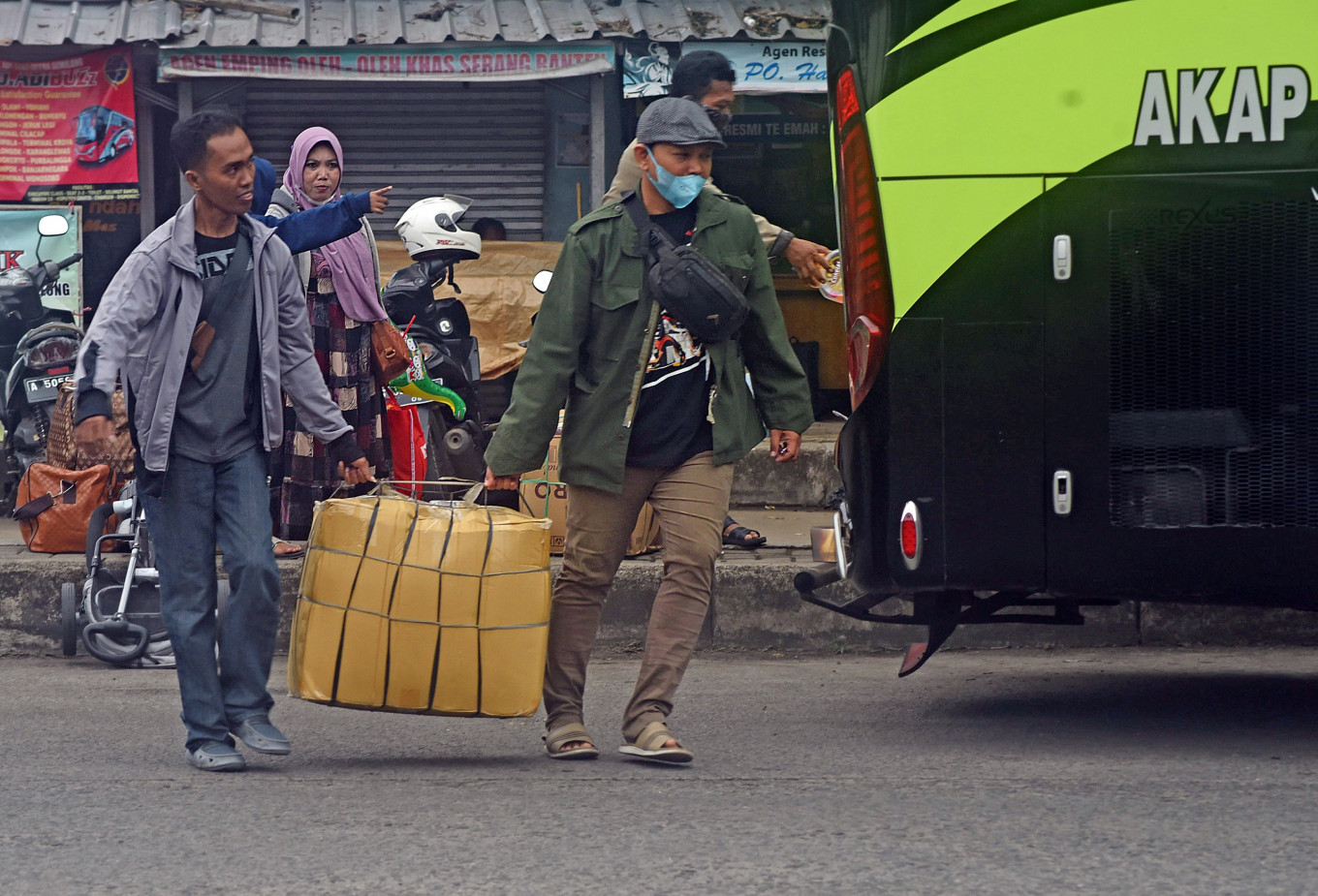Many ‘mudik’ travelers yet to return after policy shift
The Transportation Ministry reported that based on data compiled by state-owned toll road operator PT Jasa Marga, only 53 percent of the 2.1 million vehicles that left Greater Jakarta before the holiday had returned by Saturday.
Change Size

M
em>Mudik (exodus) travelers appear to be heeding the government’s call to stagger their return journeys to limit traffic congestion, as only around half of the vehicles that left Greater Jakarta ahead of Idul Fitri had made the return trip as of Saturday.
The Transportation Ministry reported that based on data compiled by state-owned toll road operator PT Jasa Marga, only 53 percent of the 2.1 million vehicles that left Greater Jakarta before the holiday had returned by Saturday. Similarly, just under 59 percent of the 894,000 people who had crossed from Java to Sumatra via Banten’s Merak Port had returned.
Policymakers previously expected travelers to return primarily on Saturday and Sunday, the last weekend of this year’s Idul Fitri holiday.
“The government has been calling intensely for the public to go home after [Sunday], in order to prevent major traffic congestion,” ministry spokesperson Adita Irawati said on Monday, adding that mudik returns had peaked on Saturday.
That day, the ministry reported 170,000 vehicles traveling on the trans-Java toll road network toward Jakarta – nearly double the 90,000 vehicles recorded on Wednesday, two days after Idul Fitri.
The volume of vehicles caused heavy traffic along the Kalikangkung toll road on Saturday, prompting authorities to change the direction of certain lanes earlier than planned – starting from 7 a.m. – and to apply the policy from kilometer 414 of the highway, outside of Semarang, to the Halim toll gate in East Jakarta.
The modified traffic plan was originally intended to begin at 11 a.m. and be in force from kilometer 188 of the Palimanan toll road – outside of Cirebon, West Java – to kilometer 72 of the Cikampek toll road.
Jakarta’s Soekarno-Hatta International Airport recorded 1,150 flights to and from the airport and 150,000 passengers on Sunday – the highest since the pandemic started – although it was unclear how many passengers were returning from mudik.
While millions of Indonesians have yet to return, Adita said additional traffic management policies would be unnecessary, as the remaining return flow would likely be spread out over the coming days.
Holiday extension
Two days after Idul Fitri, President Joko “Jokowi” Widodo called on Indonesians to extend their holiday plans to prevent congestion on the return trip.
Cabinet members suggested that state institutions and the private sector allow employees to work remotely this week.
The Education, Culture, Research and Technology Ministry, meanwhile, extended the Idul Fitri break for schools in Jakarta, Banten and West Java until Wednesday. Students are now to return to school on Thursday, instead of the previous Monday start date.
Inevitable congestion
Although the number of mudik participants this year fell below the government’s predictions, many of the country’s arterial roads were congested ahead of and after Idul Fitri.
Motorists on the trans-Java toll road, for instance, were stuck for hours in traffic jams during the peak of the homebound exodus. In response, authorities extended one-way traffic arrangements along the road.
Transportation expert Djoko Setijowarno of the Indonesian Transportation Society (MTI) said congestion during the Idul Fitri holidays was “simply unavoidable” even if traffic policies were well implemented.
“What’s important is that the congestion remains under control and does not grind [traffic] to a complete halt,” he said on Sunday, adding that bottlenecks at rest areas, vehicle buildups on the side of the road and traffic accidents had caused much of the congestion.
Transportation Minister Budi Karya Sumadi said on Monday that this year’s mudik travel policies had “generally gone well".
“We will continue to evaluate [our policies] so that future mudik periods and other occasions with high public mobility can be better anticipated," Budi said in a press statement, adding that the government hoped that this year's Idul Fitri holidays would help kick-start the economic recovery.
Transportation expert Harya S. Dillon lauded the government’s decision to allow Indonesians to partake in mudik this year, saying it was “something the public had been longing for for two years".
But he added that the government had not called for people to extend their vacations early enough and had not sufficiently communicated the nature and timing of traffic policies, leaving travelers too little time to alter their plans.
— Nina A. Loasana contributed to this story.









